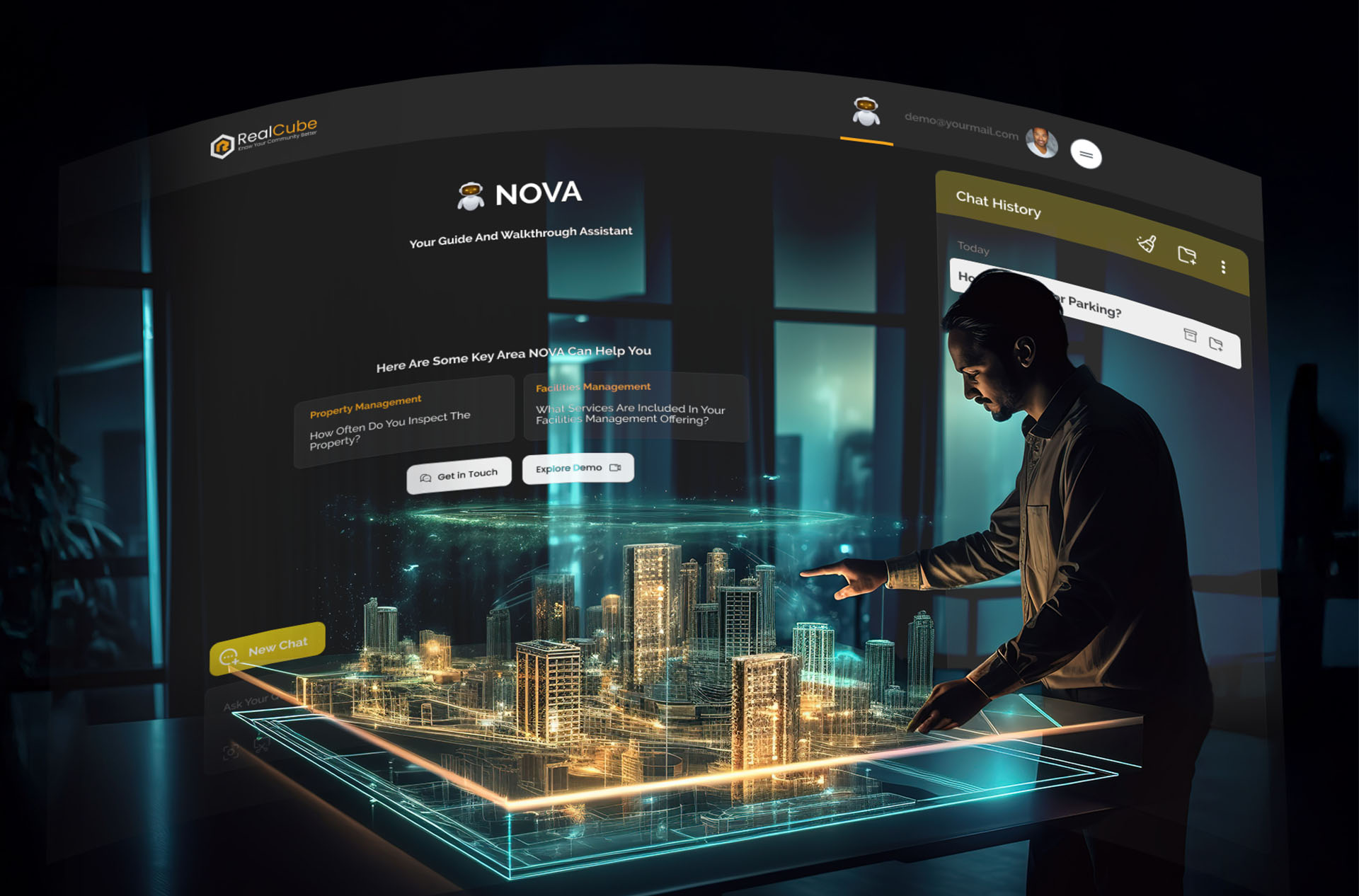


The world of real estate is undergoing a massive transformation, driven by the rise of artificial intelligence (AI). Once considered a niche technology, AI is now a powerful tool that is reshaping how properties are bought, sold, managed, and developed. For C-level executives and developers, understanding how AI can revolutionize the real estate industry is crucial for staying competitive in a rapidly evolving market.
In this blog, we will explore how AI is becoming the next frontier for the property sector, the key ways it’s transforming the industry, and why real estate professionals must embrace AI to stay ahead of the curve.
Overview: The Growing Role of AI in Real Estate
The real estate market is notoriously complex, requiring deep insights into market trends, pricing, risk assessment, and customer preferences. In the past, these processes were handled manually or using basic data analysis tools, but AI is changing the game by offering more accurate predictions, faster processes, and automated decision-making.
From predictive analytics and intelligent chatbots to automated property management and AI-driven market analysis, the possibilities are endless. With AI-powered tools, real estate professionals can now make data-driven decisions, optimize operations, enhance customer experiences, and unlock new revenue streams.
As AI continues to evolve, its role in real estate will only grow. For C-level executives and developers, adopting AI technologies is no longer optional—it’s essential for staying competitive and innovative in today’s market.
AI in Real Estate: Key Applications and Benefits
1. Predictive Analytics for Market Trends
AI-driven predictive analytics allows developers, investors, and property managers to gain insights into market trends, property values, and future growth. By analyzing historical data, AI algorithms can identify patterns and forecast market movements, providing a clearer picture of where the best investment opportunities lie.
For example, AI can predict areas of cities that are likely to see property value increases based on factors like urban development, infrastructure projects, and demographic shifts. This helps developers make more informed decisions when acquiring land or investing in new projects, leading to higher returns.
By leveraging AI, C-level executives can reduce risk and ensure that development projects are aligned with the future market demands, maximizing profitability.
2. Smart Property Valuations
Traditional property valuations often rely on manual assessments or outdated models, which can be slow and inaccurate. AI-powered valuation tools, on the other hand, use real-time data from multiple sources—such as property sales, neighborhood trends, and even social media sentiment—to calculate a property’s current market value.
These systems can offer much more precise valuations by factoring in variables like proximity to schools, transportation links, and neighborhood amenities. As a result, developers can make better pricing decisions, while investors can more accurately assess the value of a property before committing to a purchase.
3. AI-Driven Property Management
Property management is another area where AI is making waves. Automated systems can handle everything from tenant inquiries to maintenance requests, freeing up time for property managers to focus on strategic tasks. AI-powered chatbots can answer tenant questions 24/7, while intelligent systems can automate tasks such as rent collection, lease renewals, and scheduling maintenance.
For developers, this can result in cost savings and increased efficiency, while also improving tenant satisfaction. By providing an enhanced, more responsive tenant experience, developers can increase retention rates and attract high-quality tenants.
4. AI for Personalized Customer Experiences
In the digital age, consumers expect personalized experiences across all industries, including real estate. AI-powered tools can analyze data about potential buyers or renters, such as their preferences, behaviors, and past interactions, to provide highly personalized property recommendations.
This level of customization not only improves the customer experience but also increases conversion rates. Real estate professionals can leverage AI to deliver targeted advertising, virtual property tours, and tailored recommendations, creating a more engaging and efficient sales process.
5. AI-Powered Construction and Development
For developers, AI is also transforming the construction and design processes. Using AI-driven design tools, developers can simulate different construction methods, materials, and designs to determine the most efficient, cost-effective, and sustainable approach to building properties. AI also helps streamline project timelines, manage resources, and predict potential delays.
Moreover, AI can be integrated into smart buildings, where connected systems can optimize energy use, security, and overall building performance. For example, AI can monitor heating, cooling, lighting, and security systems in real time, adjusting them for maximum efficiency and comfort.
By integrating AI into construction processes and buildings, developers can deliver projects that are not only faster and more cost-effective but also smarter and more energy-efficient.
Why C-Level Executives and Developers Must Embrace AI
1. Staying Competitive in a Tech-Driven Market
The real estate industry is increasingly being driven by technological advancements. By embracing AI, C-level executives can position their companies at the forefront of innovation, ensuring they are equipped to handle the evolving demands of the market. The companies that adopt AI now will be better positioned to compete in the future.
2. Improved Efficiency and Cost Savings
AI can streamline processes, reduce operational costs, and eliminate manual tasks. For developers, this means more efficient project management, while for property managers, it can lead to lower overhead costs and improved tenant retention. AI offers tangible benefits in terms of time and money, making it an essential tool for growth.
3. Better Risk Management
AI enables real estate professionals to make data-driven decisions, reducing uncertainty and improving risk management. With AI’s ability to analyze vast amounts of data, developers and investors can assess potential risks, identify red flags, and predict future trends with a high degree of accuracy. This reduces exposure to market volatility and helps mitigate risks before they become major problems.
4. Enhanced Customer Experiences
In today’s world, customer satisfaction is a key driver of success. AI helps real estate professionals deliver personalized experiences, quicker responses, and more efficient services. Whether it’s through personalized property recommendations, faster inquiry responses, or optimized property management, AI allows developers and property managers to build better relationships with their clients and tenants.
5. Sustainability and Long-Term Value
AI can also contribute to sustainable development by helping developers design and manage energy-efficient buildings, reduce resource waste, and create eco-friendly environments. In an era where sustainability is increasingly important, embracing AI allows developers to align with green building standards and future-proof their projects.
RealCube’s Role in the AI Real Estate Revolution
RealCube stands at the forefront of this transformation, delivering AI-powered solutions designed for the unique challenges of property developers and real estate leaders. At the heart of RealCube’s platform is Nova AI, an intelligent automation engine built to optimize property workflows, enhance decision-making, and scale operations intelligently.
From automating leasing processes to providing predictive maintenance alerts and real-time analytics, RealCube’s Nova AI empowers real estate teams to work with greater precision, speed, and insight. Its capabilities are tailored to support growth, compliance, and long-term portfolio performance.
What Makes RealCube’s Nova AI Stand Out:
With RealCube’s Nova AI, real estate firms are no longer bound by traditional constraints—they're enabled by intelligent technology that adapts to market needs and drives sustainable success.
Conclusion: The Future Belongs to AI-Driven Real Estate
The property sector is evolving fast, and AI is no longer an optional advantage—it’s a competitive requirement. Developers and executives who embrace platforms like RealCube are not just optimizing their current processes—they’re building the foundation for long-term leadership in a digital-first real estate market.
Now is the time to harness the potential of AI and lead the industry into its next chapter—with confidence, clarity, and RealCube at the core.

The Digital Shift in Real Estate Strategy The real estate industry is undergoing a profound shift. Traditional…

As property management companies expand into new regions, scaling operations while maintaining efficiency…

Top 2025 Property Tech Trends to Watch 1. Artificial Intelligence (AI) and Machine…

As cities around the world grow and change to meet new challenges, the "smart city" trend has changed…

In the property management and real estate development space, one overlooked permit, expired document,…

In today’s fast-paced, document-heavy world, effective document management is crucial for any organization,…

Data is one of the most important resources for any business in the modern digital era, particularly…

Property management solutions are now crucial for guaranteeing seamless operations in the real estate…

In the dynamic, fast-paced world of community management, keeping in touch with locals is essential.…

Introduction: Change Driven by Clients, Crisis & Culture The real estate landscape is under…